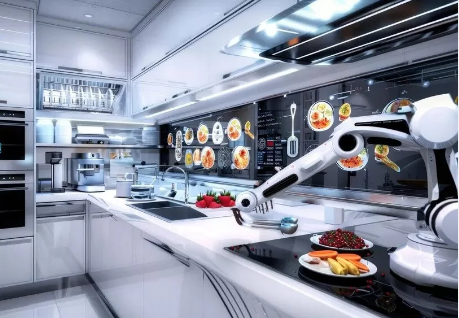How to Improve Kitchen Efficiency with Modern Equipment

In the fast-paced world of food service, efficiency determines success. Whether managing a restaurant, bakery, or catering facility, every second in the kitchen matters. Reliable appliances and optimized workflows ensure consistent quality, reduced waste, and satisfied customers. Modern technology now enables chefs and managers to work smarter rather than harder, and it all begins with selecting the right Commercial kitchen equipment manufacturer to supply innovative, durable, and energy-efficient solutions.
Understanding Kitchen Efficiency
Kitchen efficiency is the balance between speed, quality, and safety. It means maximizing productivity while minimizing wasted time, energy, and resources. An efficient kitchen allows teams to produce high volumes without compromising taste or presentation. Achieving this balance involves smart design, organized workflow, and equipment capable of handling constant demand.
Efficiency doesn’t just happen—it’s engineered. The right machines, proper maintenance, and intelligent layout are critical to performance. With today’s high-tech innovations, businesses can increase output, reduce labor, and maintain a cleaner, safer working environment.
The Role of Modern Equipment in Kitchen Productivity
Outdated appliances often lead to slow production, frequent breakdowns, and inconsistent results. In contrast, modern kitchen equipment enhances precision and performance through advanced engineering. Smart ovens, automated mixers, and programmable fryers provide exact temperature control and even heat distribution, producing consistent results every time.
Manufacturers now design appliances that communicate with one another and store data for recipe replication. These features save time, improve product uniformity, and reduce human error. Advanced food machinery also contributes to energy efficiency, cutting down utility costs and reducing carbon footprints.
Key Benefits of Upgrading Your Equipment
Investing in modern kitchen technology can deliver remarkable long-term results. Here are the primary benefits:
1. Faster Operations
Automated timers, touch controls, and preset cooking programs reduce guesswork and speed up production cycles. For bakeries and restaurants, this translates to quicker service and higher daily output.
2. Consistent Product Quality
Precision control ensures every batch tastes and looks the same. Smart appliances maintain stable heat and humidity, helping chefs deliver dishes that meet brand standards consistently.
3. Reduced Energy Costs
Energy-efficient models consume less power and water without sacrificing performance. Many units include standby and eco-modes that lower operational costs over time.
4. Improved Safety
Modern designs incorporate safety features such as cool-touch exteriors, automatic shut-offs, and easy-clean surfaces. These reduce accidents and maintain hygienic conditions in busy kitchens.
5. Space Optimization
Compact, multi-functional equipment saves valuable kitchen space. For example, combi-ovens can roast, bake, and steam—eliminating the need for multiple machines.
6. Long-Term Reliability
Advanced appliances are engineered for durability, often built with stainless steel and high-performance components. Predictive maintenance features can alert users before a malfunction occurs, minimizing downtime.
Essential Equipment for a High-Performance Kitchen
To achieve efficiency, a kitchen must prioritize certain core equipment categories that drive productivity and consistency.
1. Cooking and Baking Systems
High-speed ovens, convection units, and rotary rack ovens are now standard in modern kitchens. They provide faster cooking cycles and better temperature control, essential for bakeries and restaurants handling large volumes.
2. Refrigeration and Cold Storage
Smart refrigerators and freezers with precise temperature sensors maintain optimal food freshness. Many models feature digital monitoring systems that prevent spoilage and energy waste.
3. Food Preparation Equipment
High-capacity mixers, slicers, and dough kneaders simplify labor-intensive tasks. Automated mixing systems ensure accurate ingredient ratios, which is vital for bakeries and confectionery production.
4. Cleaning and Dishwashing Units
Commercial dishwashers with water-recycling and sanitization technology reduce resource use while maintaining hygiene. These systems can handle continuous loads with minimal supervision.
5. Ventilation and Air Filtration
Proper ventilation enhances air quality, prevents overheating, and ensures staff comfort. Advanced extraction systems remove grease, steam, and odors, creating a safer environment.
Smart Technology and Automation in Kitchens
Automation is transforming commercial kitchens into data-driven environments. Smart appliances with IoT connectivity provide real-time insights on performance, temperature control, and maintenance schedules. This information helps managers optimize workflow and detect inefficiencies early.
Automated proofing cabinets, digital baking systems, and programmable fryers deliver precision and speed unmatched by traditional equipment. With smart monitoring, managers can ensure consistent output across multiple shifts and locations.
Integration with cloud-based systems also enables recipe standardization, making it easier for global franchises and large-scale bakeries to maintain quality across all outlets.
The Importance of Ergonomic Design
Even with advanced machines, poor layout can limit efficiency. Ergonomic design ensures that staff can move freely between stations, minimizing unnecessary steps and strain. Equipment should be arranged logically, aligning with the flow of preparation, cooking, and service.
Modular systems offer flexibility, allowing adjustments based on menu changes or seasonal demand. Streamlined design combined with easy-access storage improves hygiene, speed, and morale among kitchen staff.
Choosing the Right Equipment Partner
Selecting a reliable supplier is one of the most crucial steps toward long-term efficiency. The right partner offers more than machinery—they provide expertise, customization, and continuous support. When choosing a manufacturer, consider:
Industry Experience – Look for a supplier with a proven history in food machinery manufacturing.
Customization Options – Each kitchen has unique needs; your supplier should provide tailored solutions.
Certifications and Standards – Ensure compliance with food safety and international manufacturing standards.
After-Sales Support – Access to spare parts, technical service, and maintenance assistance adds long-term value.
Innovation and R&D – Choose a partner committed to developing advanced, energy-efficient solutions.
Trends Driving Modern Kitchen Innovations
The global food industry is rapidly evolving, and kitchen equipment must keep pace. Current trends focus on sustainability, automation, and digital control systems.
Sustainability: Energy-efficient, low-emission equipment helps businesses meet environmental goals.
Automation: Smart cooking and cleaning technologies reduce labor costs and improve precision.
Compact Designs: Space-saving units maximize efficiency in small kitchens.
Remote Monitoring: IoT integration allows performance tracking and predictive maintenance.
Custom Manufacturing: Tailored machinery meets specialized production demands across global markets.
These innovations are revolutionizing how commercial kitchens operate, helping businesses achieve higher productivity and consistency while reducing costs.
Final Thoughts
An efficient kitchen is the heart of any successful food business. Modern equipment enhances not only speed and precision but also safety, sustainability, and profitability. By upgrading outdated systems and adopting smart technologies, you can transform your kitchen into a high-performance workspace that supports your long-term goals.
Partnering with a professional Commercial kitchen equipment manufacturer gives you access to cutting-edge tools, expert guidance, and dependable after-sales service. Collaborating with trusted suppliers like mirabake.com ensures your kitchen remains innovative, efficient, and ready to meet the demands of today’s fast-moving food industry.







